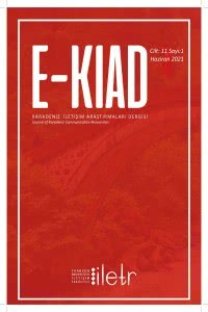İŞ GÖRENLERİN MOBBİNGE MARUZ KALMA DURUMLARI: TRABZON İLİ A GRUBU SEYAHAT ACENTELERİ ÖRNEĞİ
Turizm sektörünün emek yoğun bir sektör olma özelliği sebebiyle iş görenler, hem konuklarla hem de
Anahtar Kelimeler:
Mobbing (Psikolojik Taciz), Mobbing Süreci, İş Gören, Seyahat Acenteleri, Trabzon
A Research on Employees’ Exposure to Mobbing: The Case of Travel Agents in Trabzon
On account of being a labour-intensive sector of the tourism sector, employees are in a constant socialrelation with both co-workers and guests. For the purposes of enduring the continuity this social relation in aproductive way, it is important for employees to determine the cases of exposure conditions of “mobbing”(psychological abuse). For this reason, with this study, it is aimed to be understood “mobbing” to determine it'sprevalence through the specified attendees and to constitute as a source for future researchs. This study aims toreveal employees’ view of “mobbing” and whether or not there is a difference between their demographiccharacteristics and their exposition to “mobbing”. In order to accomplish the aim of the study, a questionnairehas been prepared and been applied to the employees working in the travel agents, that is the group of A, in thecenter district of Trabzon. As a result of the research it has been understood that employees largely not think toexposure of “mobbing”. In this case, it is possible to say that not implemented “mobbing” to employees, eventhose employees have not consider that as “mobbing” or “mobbing” survey results do not reflect the situation.
Keywords:
Mobbing (Psychological Abuse), Mobbing Process, Employees, Travel Agents, Trabzon,
___
- Acar, A. B. ve Dündar, G. (2008), İşyerinde Psikolojik Yıldırmaya (Mobbing) Maruz Kalma Sıklığı ile Demografik Özellikler Arasındaki İlişkinin İncelenmesi, İstanbul Üniversitesi İşletme Fakültesi Dergisi, 37, 2, pp. 111–120.
- Aksu, A. ve Balcı, Y. (2009), İlköğretim Okullarında Psikolojik Yıldırma ve Psikolojik Yıldırma ile Baş Etme, e-Journal of New World Sciences Academy, 4, 4, ss. 1367–1380.
- Altıntaş, V., Yılmaz, Y. and Çetinel, F. (2011), Mobbing in Accomodation Business: Sample of Antalya, e-Journal of New World Sciences Academy, 6, 4, pp. 439–454.
- Aydın, İ. S. (2008), İşyerinde Yıldırma (Mobbing) Algısına İlişkin Bir Alan Çalışması, Yayınlanmamış Yüksek Lisans Tezi, Hacettepe Üniversitesi Sosyal Bilimler Enstitüsü, Ankara.
- Aygün, H. A. (2012), Psikolojik Yıldırma (Mobbing) Üzerine Bir Araştırma, Gümüşhane Üniversitesi Sosyal Bilimler Elektronik Dergisi, 5, ss. 92–121.
- Bingöl, B. (2007), İşyerinde Yıldırma (Mobbing) ve Yıldırma Üzerine Bir Araştırma, Yayınlanmamış Yüksek Lisans Tezi, Dokuz Eylül Üniversitesi Sosyal Bilimler Enstitüsü, İzmir.
- Çarıkçı, İ. H. ve Yavuz, H. (2009), Çalışanlarda Mobbing (Psikolojik Şiddet) Algısı: Sağlık Sektörü Çalışanları Üzerine Bir Araştırma, Süleyman Demirel Üniversitesi Elektronik Sosyal Bilimler Enstitü Dergisi, 2, 10, ss. 47–62.
- Dangaç, G. (2007), Örgütlerde Psikolojik Yıldırma (Mobbing) ve Bir Araştırma, Yayınlanmamış Yüksek Lisans Tezi, Balıkesir Üniversitesi Sosyal Bilimler Enstitüsü, Balıkesir.
- Daniel, T. A. (2006), Bullies in the Workplace: A Focus on the “Abusive Disrespect” of Employees, http://noworkplacebullies.com/yahoo_site_admin/assets/docs/BulliesintheWorkplace1HR_Magazine.23410104 0.pdf (accessed 5 March 2012).
- Demir, Y. ve Çavuş, M. F. (2009), Mobbing’in Kişisel ve Örgütsel Etkileri Üzerine Bir Araştırma, Niğde Üniversitesi İİBF Dergisi, 2, 1, ss. 13–23.
- Ekşici, Ş. (2009), Kurum ve Kuruluşlarda Psikolojik Taciz (Mobbing) Eylemleri ve Çalışanların Motivasyonu Üzerine Etkisi, Yayınlanmamış Yüksek Lisans Tezi, Selçuk Üniversitesi Sosyal Bilimler Enstitüsü, Konya.
- Filizöz, B. ve Ay, F. A. (2011), Örgütlerde Mobbing ve Tükenmişlik Olgusu Arasındaki İlişkilere Yönelik Bir Araştırma, e-Journal of New World Sciences Academy, 6, 2, ss. 229–241.
- Işık, E. (2007), İşletmelerde Mobbing Uygulamaları İle İş Stresi İlişkisine Yönelik Bir Araştırma, Yayınlanmamış Yüksek Lisans Tezi, Yıldız Teknik Üniversitesi sosyal Bilimler Enstitüsü, İstanbul.
- İlhan, Ü. (2010), İşyerinde Psikolojik Tacizin (Mobbing) Tarihsel Arka Planı ve Türk hukuk Sisteminde Yeri, Ege Akademik Bakış Dergisi, 10, 4, ss. 1175–1186.
- Karavardar, G. (2010), Psikolojik Yıldırma ile Bazı Kişilik Özellikleri Arasındaki İlişki, e-Journal of New World Sciences Academy, 5, 3, ss. 212–233.
- Karcıoğlu, F. ve Çelik, Ü. H. (2012), Mobbing (Yıldırma) ve Örgütsel Bağlılığa Etkisi, Atatürk Üniversitesi İktisadi ve İdari Bilimler Dergisi, 26, 1, ss. 59–75.
- Karyağdı, A. (2007), Örgütlerde Yıldırma (Mobbing) ve Bir Araştırma, Yayınlanmamış Yüksek Lisans Tezi, İnönü Üniversitesi Sosyal Bilimler Enstitüsü, Malatya.
- Özdemir, M. ve Açıkgöz, B. (2007), Mobbing’e Maruz Kalanların Tepki Seviyelerinin Ölçümü, Sakarya Üniversitesi 15. Ulusal Yönetim ve Organizasyon Kongresi, ss. 912–919, Sakarya.
- Shallsross, L., Sheehan, M. and Ramsay, S. (2008), Workplace Mobbing : Experiences in the Public Sector, International Journal of Organisational Behaviour, 13, 2,pp. 56–70.
- Tanoğlu, Ş. Ç. (2006), İşletmelerde Yıldırmanın (Mobbing) Değerlendirilmesi ve Bir Yüksek Öğrenim Kurumunda Uygulama, Yayınlanmamış Yüksek Lisans Tezi, Selçuk Üniversitesi Fen Bilimleri Enstitüsü, Konya.
- Tayyar, S. (2008), İşletmelerde Psikolojik Yıldırma (Mobbing) ve Etkilerine Yönelik Bir Araştırma, Yayınlanmamış Yüksek Lisans Tezi, Gebze Yüksek Teknoloji Üniversitesi Sosyal Bilimler Enstitüsü, Gebze.
- ISSN: 2146-3212
- Başlangıç: 2011
- Yayıncı: Karadeniz Teknik Üniversitesi
